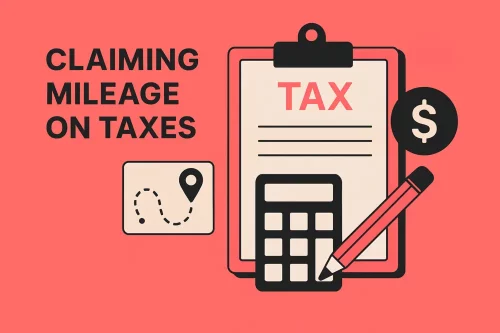IRS Mileage Guide
Home » Mileage Tax Deduction » Claiming Mileage on Taxes
Last Updated: July 22, 2025
Claiming mileage on taxes is a smart way to lower your tax bill if you use your vehicle for business, medical, or charitable purposes. This guide breaks down everything you need to know to file for a vehicle expense deduction on your tax return. We’ll cover how to choose the best deduction method for you, and the critical importance of keeping accurate records to ensure you maximize your savings and stay IRS-compliant.

Table of Contents
What Qualifies for Mileage Deduction?
The IRS allows you to deduct vehicle expenses for specific purposes. It’s crucial to distinguish these from personal trips, like your daily commute, which are generally not deductible.
- Business: This covers travel for your trade or business, such as visiting clients, attending meetings, or making deliveries. This is often the largest category for many taxpayers.
- Medical: You can deduct mileage driven for medical care, including trips to doctor’s appointments, hospitals, or pharmacies.
- Charitable: If you volunteer for a qualified charity, you can deduct the miles driven for that organization.
- Moving (for military personnel): For members of the armed forces moving due to a permanent change of station, certain moving expenses, including mileage, can be deductible.
Calculating your Mileage for Taxes
When claiming mileage on taxes, you typically have two ways to calculate your deduction: the standard mileage rate or the actual expenses method. It’s important to understand both to pick the one that gives you the biggest tax break.
Standard Mileage Rate Method
This is the simpler approach. You just multiply your deductible miles by the IRS rates for that year. To use the business mileage rate, you need to use fewer than five vehicles for business and can’t have taken certain past deductions. If you own the car, you must start with the standard mileage rate in the first year it’s used for business, but you can switch to actual expenses later. If you lease the car, you have to stick with the standard mileage rate for the entire lease term, including any renewals. Read about these rules here on the IRS’s official webpage.
How it works
Let’s say you drove 1,500 business miles in 2025. Using the business rate of $0.70 per mile, your deduction would be: 1,500mi × $0.70 = $1,050.
Pros
It’s easy to calculate and requires less detailed record-keeping for expenses. However, detailed mileage logs are a must, and keeping receipts of business-related vehicle expenses is a good practice, as it serves as additional proof in case of an audit.
Cons
It might not always result in the largest deduction if you have high vehicle-related costs.
Actual Expenses Method
This method allows you to deduct the actual costs of operating your vehicle for business, medical, or charitable purposes.
What you can deduct
- Gas and oil
- Repairs and maintenance
- Tires
- Insurance
- Vehicle registration fees and licenses
- Lease payments (if applicable)
- Depreciation (if you own the vehicle)
How it works
You add up all your actual vehicle expenses for the year. Then, you determine the percentage of miles you drove for qualified purposes (e.g., business) versus total miles driven. You can then deduct that same percentage of your total expenses. For example, if your total car costs were $6,000 for the year and 80% of your mileage was for business, you could deduct $4,800 ($6,000 × 0.80).
Pros
Can lead to a much larger deduction if your gas, repair, or insurance costs are high.
Cons
Requires meticulous record-keeping of every single vehicle expense, including receipts for everything. If you use your car for both personal and business trips, you still need to track your miles in order to accurately calculate the ratio of deductible and non-deductible trips.

Filing for your Mileage Deduction
Once your records are in order, claiming mileage for taxes is a straightforward process. Use your mileage totals to complete the appropriate tax forms: Schedule C, attached to Form 1040 for self-employed individuals, or Form 2106 for qualifying employees. Simply enter the calculated deduction based on the method you’ve chosen.
If you’re using tax software, it will usually guide you through entering this information step-by-step. Just make sure your mileage log is accurate and complete, and you have all vehicle-related receipts in order (especially for the actual expense method), as the IRS may ask for documentation to back up your claim.
Leveraging Technology for a Spotless Mileage Log
Now that we’ve covered the ins and outs of claiming mileage on taxes, let’s talk about how modern technology can make this process painless, efficient, and audit-proof.
MileageWise offers powerful tools designed specifically to help self-employed individuals, small businesses, and even corporate teams automate their mileage logs, ensure IRS compliance, and significantly boost their mileage tax deduction.
Mobile App for Tracking Mileage
- Automatic Mileage Tracking: Capture miles with smart tracking options.
- Route Flexibility: Choose to track exact routes or optimized distance calculations.
- Quick Setup: Start logging trips in minutes, no tech headaches.
- Reliable Trip Starts: Backup logging ensures accurate entries, an issue with most apps.
- Waze Sync: Navigate with Waze while your trip is logged simultaneously.
- Ad-Free & Private: Track your drives without pop-ups, upselling or data concerns.
- Expense Integration: Keep mileage and other tax-deductible expenses in one place.
Dashboard for Retroactive Logging
Forgot to track your mileage? Rebuild logs that meet IRS standards with just a few clicks.
- IRS Auditor Tool: Flags missing details and inconsistencies to help you stay compliant.
- Bulk Trip & Client Upload: Add fixed routes or client lists all at once.
- Smart Trip Editing: Edit, categorize, and manage past trips with ease.
- Google Maps Timeline Import: Import your Google Location History and convert it into an IRS-compliant log in an instant.
- AI-Powered Mileage Wizard: Reconstructs trips according to your driving history and preferences. Fills in trip gaps for a complete and compliant log.
Lifetime Plans: Unique to MileageWise
Unlike other mileage tracking apps, MileageWise offers lifetime plans—perfect for anyone serious about maximizing tax savings year after year. No subscriptions. No surprises. Just a one-time payment for unlimited access.
- Small Lifetime Deal: Log unlimited miles with our easy-to-use app and generate tax-ready reports with AI assistance. All for a one-time fee of $119.
- Gold Lifetime: Need to log past miles too? This plan lets you track both current and previous trips, recover data from your Google Timeline, and create IRS-compliant mileage logs anytime you need.
Try MileageWise for free for 14 days. No credit card required!
Customer Story: Finally Claiming Mileage for Taxes with Confidence
I’m a mobile locksmith, driving all over town for emergency calls, and tax season used to stress me out. I was always second-guessing my mileage log, even though I tried my best to write down every trip. I knew there must be an easier way, but I didn’t know what to do.
My accountant suggested MileageWise, and I haven’t looked back. I downloaded the app and instantly started on automatic tracking. Now, everything is logged accurately, without me lifting a finger. No more missed deductions or audit worries. I finally feel in control, and my last refund proved it.
Conclusion: Take Control of Your Mileage Deductions
Claiming mileage on taxes is a significant opportunity to reduce your taxable income. By understanding the IRS rules, consistently tracking your miles, and leveraging smart tools like MileageWise, you can maximize your deductions confidently and efficiently.
Here’s what to do:
- Understand if you are eligible for mileage deduction.
- Choose the best deduction method for your situation: standard or actual expenses.
- Start tracking your mileage immediately using a reliable method.
- Keep meticulous records of all trips and relevant expenses.
- Review your records regularly to ensure accuracy and completeness.
- Calculate your deductible miles before filing for your deduction
- Utilize a professional mileage tracking solution to simplify the entire process and ensure IRS compliance.
FAQ
Who can claim mileage on their taxes?
Typically, self-employed individuals, small business owners, freelancers, and independent contractors can claim mileage as a tax deduction. Employees generally cannot claim mileage for work-related driving unless it is part of an unreimbursed accountable plan (due to the suspension of miscellaneous itemized deductions from 2018 through 2025 under the Tax Cuts and Jobs Act).
What types of driving qualify for a mileage deduction?
Deductible miles usually include driving for business purposes (sales calls, meetings, client visits, business errands), medical appointments, moving (for active-duty military only), and work for charitable organizations. Commuting from home to your regular workplace does not qualify.
How do I calculate my deductible mileage?
You can choose between the standard mileage rate (multiplying qualifying miles by the IRS rate) or the actual expense method (calculating the percentage of your vehicle’s expenses that are business-related). The standard mileage rate is simpler and more commonly used.
How do I claim mileage on my taxes?
If you’re self-employed, report business mileage on Schedule C (Form 1040). For medical and charitable mileage, use Schedule A to itemize deductions (if you qualify). Attach Form 2106 only if claiming as a qualified employee.
How do I prove or substantiate my mileage claim to the IRS?
Keep a mileage log that records the date, starting location, destination, purpose of the trip, and number of miles driven for each business trip. You should also record your odometer readings at the start and the end of the year.
Keeping receipts for your vehicle expenses is a must if you use the actual expense method. However, they serve as additional proof if you choose the standard mileage rate method.
Maintain these records for at least three years in case of an audit.


